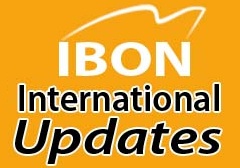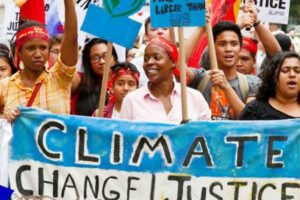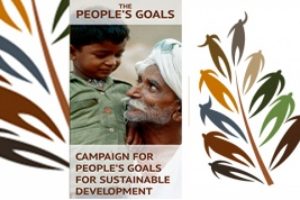Reportage from UNFCCC COP18 in Doha
Climate, Number 5
[[{“type”:”media”,”view_mode”:”media_large”,”fid”:”58″,”attributes”:{“alt”:””,”class”:”media-image”,”height”:”71″,”style”:”font-size: 12px; width: 310px; height: 71px; margin: 10px; float: right;”,”typeof”:”foaf:Image”,”width”:”310″}}]]
DOHA, December 1, 2012 — The Green Climate Fund (GCF), the principal multilateral financial mechanism to deal with climate change, is foreseen to be the subject of yet more intense debates at the 18th Conference of Parties (COP) of the United Nations Framework Convention on Climate Change (UNFCCC).
A Report of the Green Climate Fund and guidance to the GCF has been prepared by the co-chairs, culled from different submissions from the Umbrella Group (Australia, Canada, Japan, New Zealand, Norway, the Russian Federation, Ukraine and the US), European Union, Philippines, United States and the Like-Minded Developing Countries (LMDC). LMDC is a platform for like-minded developing countries to exchange views and coordinate positions on the climate negotiations with the view of contributing to achieving the combined goals of environmental sustainability, social and economic development, and equity.
However, a revised draft text is expected to be presented following comments from several Parties that the latest draft texts do not reflect their submissions. Other Parties have also expressed their intentions of making additional submissions on these agenda items.
The current draft co-chairs’ text sets into motion the Standing Committee on Finance to assist the COP in tackling macro issues surrounding climate finance specifically to push for improved coherence. The Cancun Long-term Cooperative Action (LCA) Agreement outlined four areas in which the Standing Committee is to assist the COP: first, improving coherence and coordination in the delivery of climate finance; second, the rationalization of the financial mechanism; third, the mobilization of financial resources; and fourth, measurement, reporting and verification of support provided to developing countries.
The draft text is expected to be the subject of debates particularly on the issue of the arrangement between the COP and the GCF Board. Stark differences in views remain as Parties are yet to resolve whether the COP and the GCF Board are of equal stature. The current draft text shows expressions of the authority and guidance of the COP over the GCF Board as the former identifies several areas for implementation by the latter including: (a) the establishment of an independent secretariat; (b) appointment of an Executive Director; (c) developing, together with the Republic of Korea, the legal and administrative arrangements for hosting the Fund in an expeditious manner; (d) implementing its work plan with a view to make the Fund fully operational as soon as possible; (e) developing the transparent non-objection procedure to be conducted through national designated authorities in a timely manner; (f) ensuring a balanced allocation of the resources of the Fund between adaptation and mitigation activities; and (g) setting up the thematic funding windows on mitigation and adaptation, among others.
However some Parties from developed countries insist on equal status between the COP and the GCF. They assert that since the GCF has an independent identity, it should be able to draw up its own terms of reference and set of guidelines. On the other hand, other Parties as well as many civil society groups are wary of allowing the GCF to define its own operational mandate for fear that it might follow the model of other international financial institutions such as the World Bank with its shortcomings in terms of transparency, accountability and private-sector bias.
The draft text also takes note of the cumulative contributions of USD 3.546 million made by the governments of Australia, Finland, the Netherlands, and the Republic of Korea for the start-up costs of the Fund. But the draft text urges Parties to continue to make financial contributions to the Fund “as soon as possible.”
Parties are expected to resolve come to a decision by December 6th. ###


